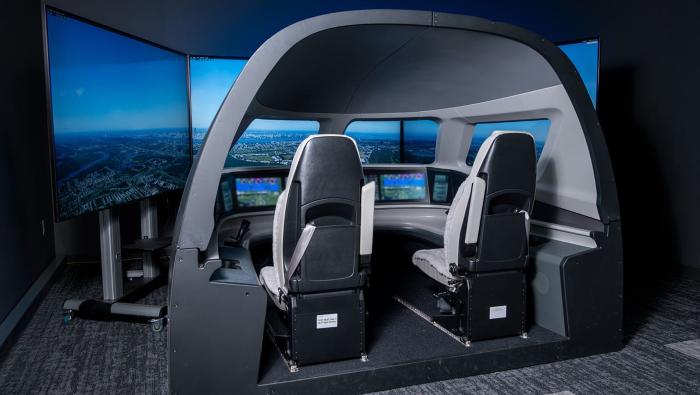|
Flexjet and Ferretti Group have unveiled Riva Volare, a custom interior concept for the Gulfstream G650 and Sikorsky S-76 at the fractional aircraft provider, drawing inspiration from the design of Riva motoryachts. The collaboration deepens the relationship between the two luxury brands, merging aviation and nautical craftsmanship. “Seeing this brought to life in our aircraft is nothing short of exceptional,” said Flexjet chairman Kenn Ricci. “Design is more than an aesthetic bonus—it’s integral to the elevated experience we offer. Riva Volare is a bold statement of where we’re going—defining the standard for what it means to be a modern luxury brand.” “Riva style is an expression of elegance that infuses every project with class and exclusivity,” added Ferretti Group CEO Alberto Galassi. “Contemplating the sky and the clouds while immersed in the world of Riva is an incredibly beautiful and satisfying experience.” The interiors are featured on one Gulfstream G650 and two Sikorsky S-76s, based in Florida and Milan. Operating from a new Flexjet helicopter base at the Milan Linate Prime terminal, one of these helicopters will support routes across Italy and the French Riviera. The unveiling event was held at the same location, with a display that included the aircraft and a Riva Aquariva Special motoryacht. |
|
|
The U.S. Senate yesterday passed H.R.1, a revised budget reconciliation bill that includes “several provisions to promote the growth, safety, and sustainability of U.S. aviation,” according to NBAA. An earlier version of the bill passed the House of Representatives on May 22, but the revised bill goes back to the House for a final vote by Friday. Included in the Senate bill are aviation items from the House version, which NBAA and more than 50 other aviation organizations support. Notably, $12.8 billion is earmarked for the “transformation of the nation’s air traffic control technologies, facilities, and other infrastructure.” Another provision would permanently reinstate 100% bonus depreciation for new and preowned aircraft, NBAA noted. A four-year extension of the Section 45Z Clean Fuel Production Credit is included, but the value of the credit drops to $1 from $1.75 per gallon. “While the credit is among the initiatives that spurred the doubling of U.S. SAF production from December 2024 to February 2025, the reduction in credit value could make it difficult to meet increasing demand,” NBAA explained. “We thank the Senate for recognizing with this initial funding that a safe and efficient national airspace requires a robust, resilient ATC system that bolsters our nation’s global aviation leadership,” said NBAA president and CEO Ed Bolen. |
|
|
Wichita-based Yingling Aviation is now a Honeywell-authorized dealer for the manufacturer’s engines, avionics, and auxiliary power units (APUs). This enables Yingling to sell and renew Honeywell Maintenance Service Plan contracts and service Honeywell products. As a Honeywell dealer, Yingling Aviation can support the company’s avionics and maintain HTF7000 and TFE731 engines and GTCP36-150, RE-220, and RE-100 APUs. Yingling is also stocking Honeywell’s DU-1310-2 flight displays that replace obsolete DU-1310-1 units in Gulfstream G350 through G650 models and Dassault Falcons equipped with EASy II avionics. The DU-1310-2 displays are already approved as part of those aircraft’s illustrated parts catalogs and require just “a simple logbook entry” to replace, according to Yingling. “The DU-1310-1 displays are no longer supported or covered under MSP-A contracts, and sourcing used units is difficult and expensive,” said Josh Peterson, avionics sales manager at Yingling Aviation. “We’ve brought in the DU-1310-2 displays to help operators stay ahead of AOG situations and minimize downtime with a plug-and-play upgrade path.” Yingling is offering a $6,000 rebate per DU-1310-2 for two or more. “Operators can choose to handle this proactively, or risk facing longer downtime and availability issues later,” said Peterson. “If a customer is considering the upgrade and needs help navigating pricing or rebate options, we’re here to assist.” |
|
|
Modern Aviation has taken over operations as the sole business aviation services provider at North Carolina’s Charlotte Douglas International Airport (KCLT). In March, the growing FBO chain was declared the winner of the airport’s RFP process to manage the facility, nudging out long-time incumbent Wilson Jet Center. “As we look to the future with Modern Aviation, we are excited to introduce a new era of private aviation in Charlotte—one driven by innovation, elevated service, and a focus on exceeding the evolving needs of our customers,” said Ted Kaplan, KCLT’s chief business and innovation officer. This represents its 19th location for Modern, which was established in 2018. To ensure continuity of service, it offered to retain all the staff at the FBO, which the vast majority accepted. As per its lease agreement with the airport administration, it will upgrade the FBO terminal, with construction expected to begin by year-end. >“We are thrilled to expand our presence at Charlotte Douglas International Airport, a key general aviation hub in North America,” said Modern CEO Mark Carmen. “This marks an exciting new chapter at KCLT as we will continue to provide exceptional service and integrate our safety culture to elevate the experience for our customers.” |
|
|
Sponsor Content: RTX Semi-autonomous software systems can help with manual tasks and cognitive calculations, freeing pilots to focus on critical thinking and decision-making. Collins Aerospace, an RTX business, has been developing and testing those systems. |
|
|
Henderson Jet Services (HJS) has acquired a HondaJet Elite and is parting out the jet, offering its components to the aftermarket. Adding the HondaJet to the HJS inventory is “a direct response to increasing market demand and limited availability of high-quality, certified components for the HondaJet platform operators, MROs, and aviation suppliers,” according to HJS. Available components from the HondaJet Elite include cockpit items and avionics, cabin and interior assemblies, landing gear and brakes, flight control systems, wing leading edge components, and fuselage and wing assemblies. “We’re excited to bring the HondaJet Elite into our program,” said HJS president Scott Lawson, “and this acquisition presents a unique opportunity for operators and maintenance providers to access a complete catalog of certified components from a platform that is otherwise difficult to support in the aftermarket. With high demand and limited availability for quality aftermarket parts, integrating the HondaJet Elite enables us to better serve HondaJet owners.” He added, “Through our trusted white-glove disassembly and certification process, operators can now source critical components—ranging from flight deck and avionics to engines and interiors—with confidence in both quality and traceability. Each component is meticulously removed, inspected, tagged, and made ready for global shipment through our secure logistics channels.” Based in Georgetown, Texas, HJS has previously parted out Bombardier Globals and Challengers. |
|
|
The Air Charter Safety Foundation appointed executive director Debi Carpenter as president, effective July 1, following the retirement of president and CEO Bryan Burns after more than a decade of leadership. Burns, who brought more than 35 years of aviation industry experience to ACSF, previously served as general manager at several FBOs, including Signature Aviation at Washington Dulles International Airport (KIAD) and Ronald Reagan Washington National Airport (KDCA). During his tenure at ACSF, Burns transformed the organization into a leading voice in aviation safety across charter, corporate, private, and advanced air mobility sectors. He championed the expansion of programs such as the Aviation Safety Action Program and the Industry Audit Standard. “Bryan’s leadership has not only elevated ACSF but also set a new standard for safety culture and collaboration across our industry,” said ACSF board of governors chairman Kent Stauffer. Carpenter joined ACSF in June 2023 with more than two decades of aviation safety experience. “Driving a culture of aviation safety requires a clear strategy, shared understanding, and strong team commitment,” she said. “Our goal is to equip them with the tools, insights, and education needed to raise the bar on safety excellence.” She will oversee the expansion of ACSF’s data initiatives to help member organizations identify trends and reduce risk through predictive safety culture development. Burns will remain in an advisory capacity during the transition. |
|
|
Portside’s Avianis flight management system has integrated with Jet Aviation Staffing Marketplace, providing business aviation operators with access to a digital recruitment tool within the Avianis platform. This enables users to post jobs, manage candidates, and track staffing updates within their Avianis profile. The integration links users to Jet Aviation’s centralized staffing database, enabling end-to-end crew management without toggling between systems. According to Portside, the system supports everything from candidate search to application review and tracking, automating key workflows and syncing changes across platforms. “This partnership…reflects our mission to revolutionize business aviation by driving simplicity,” said Portside CEO Alek Vernitsky. “It’s a meaningful step toward digitizing the industry, reducing silos, and putting operators back in control of their workforce.” San Francisco-based Portside’s modular aviation software suite supports flight departments, regional airlines, and leasing operators with tools for operations, compliance, crew, and finance. This latest integration aligns with the company’s trend of integrating and expanding its services to offer a comprehensive toolset to users, whether in the arena of staffing or in digital flight tools for operators. For example, in March 2024 Portside integrated Universal Weather and Aviation’s Feasibility-IQ app with its Professional Flight Management (PFM) system, enabling users to sync mission details directly and access real-time trip planning intelligence. The collaboration enables PFM users to view customs, entry, and logistical data for thousands of airports. |
|
|
|
|
|
|
AINalerts News Tips/Feedback: News tips may be sent anonymously, but feedback must include name and contact info (we will withhold name on request). We reserve the right to edit correspondence for length, clarity, and grammar. Send feedback or news tips to AINalerts editor Chad Trautvetter. |
|
AINalerts is a publication of AIN Media Group, 214 Franklin Avenue, Midland Park, New Jersey. Copyright 2025. All rights reserved. Reproduction in whole or in part without permission is strictly prohibited. |















